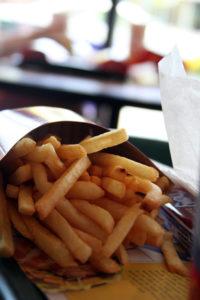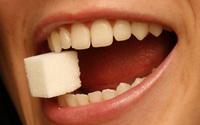Food and Tinnitus

If you are wondering if your diet can affect tinnitus noises in your ears, then you are maybe wise to be concerned. Owing to the diverse nature of tinnitus and the many different ways that this condition affects sufferers, there is no one kind of food or food products that affects everyone in the same way. There are however several ‘likely candidates’ when it comes to foods in general that may lead to tinnitus symptoms, or indeed exacerbate an existing T condition.
As for the science behind whether or not there is a direct correlation between diet and tinnitus, there is much discussion between the experts themselves. However it is generally agreed that if certain food produces conditions in the body that create a likelihood of tinnitus for certain individuals, then it is only wise to take preventative measures wherever possible.
However perhaps if we stop for a moment and ask the question “Does my diet affect me in other ways like weight gain, general health – mental and physical, even mood swings?” The answer would no doubt be a resounding YES it does. That being the case, you have to ask “can diet affect tinnitus as well as my other body functions?” The answer is a no-brainer. Everything we consume – perhaps everything we hear? – has some affect on our bodies and in our day-to-day lives.
Food creates mood swings. Some peole get high just from eating too much chocolate, which give them a real feel good factor. This is why during stressful times they will head for the biscuit tin or the choc bar. We all know that kids can get completely out of control if you feed them with sweets – especially multi-colored sweets full of artificial colorings and flavours! Personally, when I get hungry I also become totally irrational or irritable and bad tempered – my immediate family knows this well and will rush to feed me!
For some people coffee is known to produce a ‘buzz’ which in turn can lead to ringing in their ears, even though recent studies have shown that caffeine does not in fact cause tinnitus.However we are all different and act/react to what we consume in different ways. A study carried out by researchers at Bristol University in the UK found that for the majority of people, caffeine did not make tinnitus any worse and infact helped reduce tinnitus symptoms in many cases.
Really, A Poor Diet Can Affect Tinnitus Sufferers?
To ask if your diet can affect tinnitus symptoms then you need look no further than medical issues like high blood pressure. Can high blood pressure cause tinnitus? Of course it can. And can your diet or food consumption affect your blood pressure? Again, of course your diet can affect your blood pressure (to much salt for instance).
Does this mean however that if you have high blood pressure then you will contract tinnitus? No it does not. For the simple reason that there are many ‘issues’ that can lead to tinnitus – and they are by no means all food or diet related. Medical issues, noise, circumstance, age, and even genetics can all play a part in increasing the likelyhood of contracting tinnitus.
So should you be concerned about your diet, and will a good diet help tinnitus? Personally I would always advise folks to be aware of your diet, and to avoid processed foods that carry excess salt and sugar especially. Not just for reasons relating to tinnitus, but for general good health and well-being. So with that said lets look at the different food-stuffs that could be of most concern to the tinnitus sufferer.
To err on the side of caution – Medical advice from a qualified practitioner should always be sought before any major diet or food regime is followed.
Short-list of 6 foods that are commonly thought to aggravate Tinnitus.
- Excess Salt
- Sugar
- MSG (Monosodum Glutamate)
- Acohol
- Coffee (latest research casts some doubts on this)
- Saturated fats
Excess Salt:
It is generally accepted that excess sodium in the diet (salt) increases blood pressure by restricting the blood vessels and reducing the blood flow to the eyes, ears and brain – which amongst other things medical, increases or leads to tinnitus. Hardening blood vessels cause the blood to flow less freely, and can cause the condition known as Pulsatile Tinnitus, as the pulsing noise relating to the restricted blood flow is heard by the sufferer.
Reducing the salt intake by cutting down on salty snacks or processed foods (which generally contain high levels of salt); and taking less salt with food in general, can often result in an improvement in this condition.

Sugar:
Excess sugar consumption by diabetes sufferers especially, is also known to cause an increase in tinnitus symptoms. Foods rich in sugar such as candy snacks, chocolate or sugar-enriched processed foods/drinks, can all lead to tinnitus problems for diabetes sufferers especially-but not exclusively by any means. Popular fizzy drinks in fact have alarming levels of sugar, with Coca Cola being a typical example having 64g of sugar in a 600ml (20fl) drink.
This is bad news no matter what the medical condition, but for tinnitus sufferers or anyone on a diet it goes without saying avoid sugary drinks!
MSG (Monosodium Glutamate):
This is a well-known flavour-enhancer that is very commonly used in Chinese restaurants – and in many other eating establishments also. It is also widely used in many processed pre-made meals. The problem with MSG is that it is known to excite electrical activity in the brain and auditory cortex, leading to tinnitus.
Many sufferers find that by reducing the levels of MSG in their diet, perhaps by reducing their fast-food intake, they can bring their tinnitus down to manageable levels – or even remove it entirely!

Alcohol:
Many tinnitus patients have to avoid alcohol or alcoholic cocktails as they contain sugar. Alcohol also causes dehydration and increases blood pressure – both of which can lead to tinnitus problems.
Coffee:
For many years coffee has been cited as a cause of tinnitus. Recent scientific testing however has pointed to exactly the opposite. For many people cutting down on coffee actually increases their T. However it may well be worth trying a coffee-free diet for a short time in order to determine its affect.
Saturated fats:
Saturated fat, that can be found in the likes of cheese, butter, red meat, increase cholesterol levels, and over time can lead to atherosclerosis. Atherosclerosis is known to contribute to T, as well as increasing the possibility of heart disease and strokes.
General Observation:
As a general note, it has to be pointed out that most of these excesses listed above can be found in processed foods. Fast food takeaways are generally super-tasty because of the amount of sugar and/or salt added to the product. Even tinned baked beans are for the most part loaded with sugar – and don’t even mention fizzy drinks!
So are you still wondering if your can diet affect tinnitus? – For myself I have no doubt that our diet affects many things – and tinnitus could be one of them. My own opinion? Eat plenty of fresh produce whenever possible, and avoid processed, pre-shaped, pre-packaged food in general.
Ok, I agree. This may not be possible (or desirable) all the time, and a little salt or sugar every now and then is not likely to harm most folks – however if you suffer from tinnitus then it definitely helps to know your (food) enemy!
Next…Hypertension